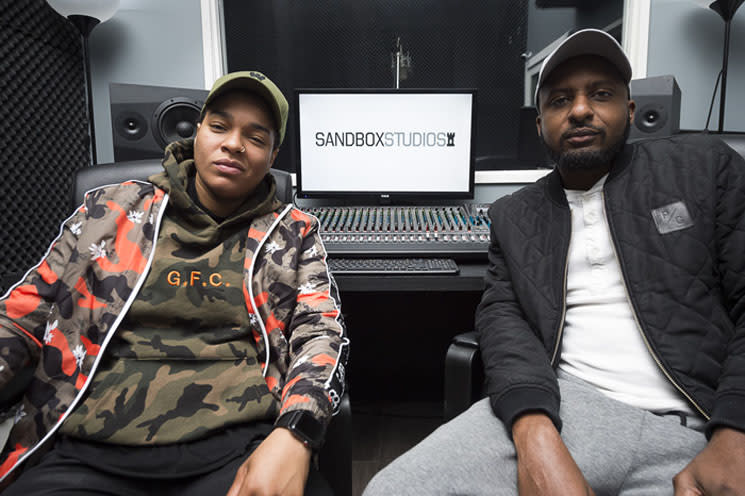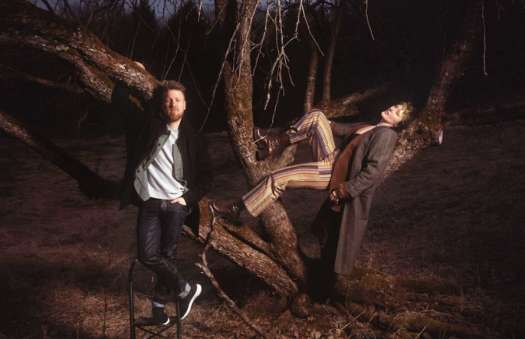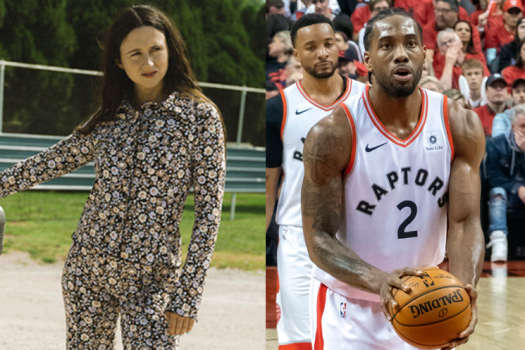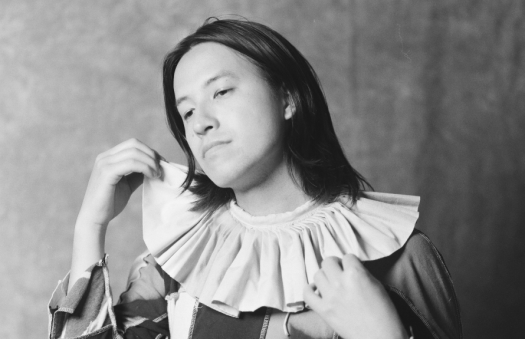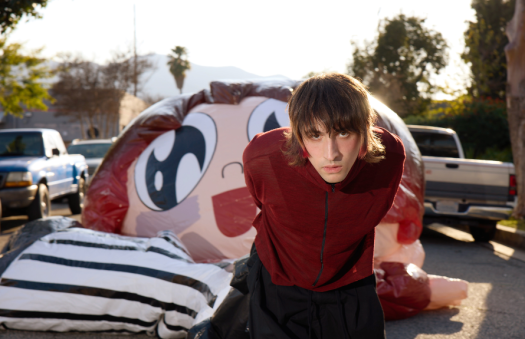"Anybody who grew up marginalized knows that when you don't see something very often, it becomes very difficult to dream about those things," says Kiana 'rookz' Eastmond, director of Sandbox Studios. "Everything I'm building right now is about helping the me that needed help when I needed it."
At 14, Eastmond's middle-class life took a turn when she became a homeless high school dropout seeking direction. It wasn't until she met Sandbox's Senior Engineer, KR Moore, that she started to find her purpose. "He originally had a studio, and I was just kinda doing nothing, and he brought me in and was like, 'Yo, learn how to do stuff!'" she says. Eastmond learned the tricks of the trade, turning to artist management shortly after. Moore, on the other hand, took a backseat role as he started a family. It would take one artist, an unfinished album and a temporary studio space to bring the two together again.
"The original intention was never to have a recording studio. When we got the [400 sq. ft.] space, it was literally just to finish that artist's music — there was no long-term plan," Eastmond states.
For five years, the duo would pay into their month-to-month lease, establishing themselves as the affordable studio on the block. From Tory Lanez and Jadakiss to younger artists like Puffy L'z and Faiza, Sandbox Studios' commitment to serving the communities around them recently allowed them to relocate to the Studio District in Toronto's East end.
"Being accessible and being as loud as we can be about the fact that we're here — I'm very proud of it," Eastmond notes. "To be the 'one' in this district, that means a lot."
Though not yet finished, the new 1850 sq. ft. space has expanded from serving artists just as a recording studio to becoming an artist development facility, equipped with a cyclorama wall for visual productions, and a blank space to hold educational classes and lifestyle events.
"A lot of our clients are marginalized people — people of colour, LGBTQ — as soon as they walk into another space [around here], people will automatically be like, 'Sandbox is over there,' just [making] the assumption, because they're not even used to seeing these people in this space," says Eastmond. "Everything we do here is to make sure that the experience of the person coming through the door feels respected."
Both Eastmond and Moore stress the importance of Sandbox Studios being a safe space, extending beyond race, religion and gender, but also financially, employing a rule where staff don't wear shoes worth over $100.
"We're not trying to perpetuate and recreate the same consumerism goals for our clients who walk through the door. Hip-hop culture is taught that consumerism and the way you look is the only defining characteristic that you need to have, and we see it all the time," Eastmond explains.
"We're one of the busiest studios in Toronto for urban music, hands down. We're booked 16 to 18 hours a day, but we use the minimum wage rule: if somebody had to work an hour for $14/hour, we're charging x-amount for three hours, that's 8 to 10 hours of their time, if not more. [So] we have to give them 15 hours of an experience and everyone on our team has to care about it," she continues. "Instead of buying really cool things or wearing Balenciagas or buying a bottle at the club, I'm gonna make sure my staff are happy. If that means I sleep on the floor, but my clients can afford to come to the studio to make better music, that's what it's about."
On the outside looking in, Sandbox Studios is a place to work, but for their staff, listening to their clients' and their needs, music-related or not, comes first.
"I like to be able to speak to a lot of the younger clients that come in here. A potential client that I met today just got out of jail. He just wants to start doing music — he feels like he failed," Moore says. "Before we jumped into their session, I had a chat with him like, 'People make mistakes. Don't let this define you.'"
While she makes it look easy, as a black queer woman, Eastmond has had her fair share of battles bringing Sandbox Studios to life. "To be black and gay, I'm already excluded from so much already. Even though I perform gender a particular way, I realize that men can scream from the top of the mountain about how awesome they are, and if they don't like an idea, they can say it's stupid, but if I give any form of critique, it's like 'Who the fuck are you?' I can't count how many times [that] men, who are respected in this city, have told me to know my place," she shares.
"A lot of people know that for many years, I was definitely blacklisted, and to have fought back so hard and [to] be here in this position right now, and starting to give us these looks and love from just being consistent in our own belief, principle and purpose, this is the moment that's like, 'We did something.'"
At 14, Eastmond's middle-class life took a turn when she became a homeless high school dropout seeking direction. It wasn't until she met Sandbox's Senior Engineer, KR Moore, that she started to find her purpose. "He originally had a studio, and I was just kinda doing nothing, and he brought me in and was like, 'Yo, learn how to do stuff!'" she says. Eastmond learned the tricks of the trade, turning to artist management shortly after. Moore, on the other hand, took a backseat role as he started a family. It would take one artist, an unfinished album and a temporary studio space to bring the two together again.
"The original intention was never to have a recording studio. When we got the [400 sq. ft.] space, it was literally just to finish that artist's music — there was no long-term plan," Eastmond states.
For five years, the duo would pay into their month-to-month lease, establishing themselves as the affordable studio on the block. From Tory Lanez and Jadakiss to younger artists like Puffy L'z and Faiza, Sandbox Studios' commitment to serving the communities around them recently allowed them to relocate to the Studio District in Toronto's East end.
"Being accessible and being as loud as we can be about the fact that we're here — I'm very proud of it," Eastmond notes. "To be the 'one' in this district, that means a lot."
Though not yet finished, the new 1850 sq. ft. space has expanded from serving artists just as a recording studio to becoming an artist development facility, equipped with a cyclorama wall for visual productions, and a blank space to hold educational classes and lifestyle events.
"A lot of our clients are marginalized people — people of colour, LGBTQ — as soon as they walk into another space [around here], people will automatically be like, 'Sandbox is over there,' just [making] the assumption, because they're not even used to seeing these people in this space," says Eastmond. "Everything we do here is to make sure that the experience of the person coming through the door feels respected."
Both Eastmond and Moore stress the importance of Sandbox Studios being a safe space, extending beyond race, religion and gender, but also financially, employing a rule where staff don't wear shoes worth over $100.
"We're not trying to perpetuate and recreate the same consumerism goals for our clients who walk through the door. Hip-hop culture is taught that consumerism and the way you look is the only defining characteristic that you need to have, and we see it all the time," Eastmond explains.
"We're one of the busiest studios in Toronto for urban music, hands down. We're booked 16 to 18 hours a day, but we use the minimum wage rule: if somebody had to work an hour for $14/hour, we're charging x-amount for three hours, that's 8 to 10 hours of their time, if not more. [So] we have to give them 15 hours of an experience and everyone on our team has to care about it," she continues. "Instead of buying really cool things or wearing Balenciagas or buying a bottle at the club, I'm gonna make sure my staff are happy. If that means I sleep on the floor, but my clients can afford to come to the studio to make better music, that's what it's about."
On the outside looking in, Sandbox Studios is a place to work, but for their staff, listening to their clients' and their needs, music-related or not, comes first.
"I like to be able to speak to a lot of the younger clients that come in here. A potential client that I met today just got out of jail. He just wants to start doing music — he feels like he failed," Moore says. "Before we jumped into their session, I had a chat with him like, 'People make mistakes. Don't let this define you.'"
While she makes it look easy, as a black queer woman, Eastmond has had her fair share of battles bringing Sandbox Studios to life. "To be black and gay, I'm already excluded from so much already. Even though I perform gender a particular way, I realize that men can scream from the top of the mountain about how awesome they are, and if they don't like an idea, they can say it's stupid, but if I give any form of critique, it's like 'Who the fuck are you?' I can't count how many times [that] men, who are respected in this city, have told me to know my place," she shares.
"A lot of people know that for many years, I was definitely blacklisted, and to have fought back so hard and [to] be here in this position right now, and starting to give us these looks and love from just being consistent in our own belief, principle and purpose, this is the moment that's like, 'We did something.'"
